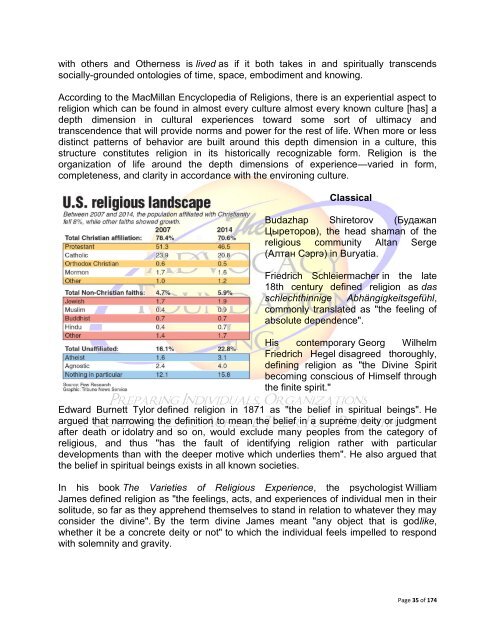The Gift of Spirituality
The Gift of Spirituality
The Gift of Spirituality
You also want an ePaper? Increase the reach of your titles
YUMPU automatically turns print PDFs into web optimized ePapers that Google loves.
with others and Otherness is lived as if it both takes in and spiritually transcends<br />
socially-grounded ontologies <strong>of</strong> time, space, embodiment and knowing.<br />
According to the MacMillan Encyclopedia <strong>of</strong> Religions, there is an experiential aspect to<br />
religion which can be found in almost every culture almost every known culture [has] a<br />
depth dimension in cultural experiences toward some sort <strong>of</strong> ultimacy and<br />
transcendence that will provide norms and power for the rest <strong>of</strong> life. When more or less<br />
distinct patterns <strong>of</strong> behavior are built around this depth dimension in a culture, this<br />
structure constitutes religion in its historically recognizable form. Religion is the<br />
organization <strong>of</strong> life around the depth dimensions <strong>of</strong> experience—varied in form,<br />
completeness, and clarity in accordance with the environing culture.<br />
Classical<br />
Budazhap Shiretorov (Будажап<br />
Цыреторов), the head shaman <strong>of</strong> the<br />
religious community Altan Serge<br />
(Алтан Сэргэ) in Buryatia.<br />
Friedrich Schleiermacher in the late<br />
18th century defined religion as das<br />
schlechthinnige Abhängigkeitsgefühl,<br />
commonly translated as "the feeling <strong>of</strong><br />
absolute dependence".<br />
His contemporary Georg Wilhelm<br />
Friedrich Hegel disagreed thoroughly,<br />
defining religion as "the Divine Spirit<br />
becoming conscious <strong>of</strong> Himself through<br />
the finite spirit."<br />
Edward Burnett Tylor defined religion in 1871 as "the belief in spiritual beings". He<br />
argued that narrowing the definition to mean the belief in a supreme deity or judgment<br />
after death or idolatry and so on, would exclude many peoples from the category <strong>of</strong><br />
religious, and thus "has the fault <strong>of</strong> identifying religion rather with particular<br />
developments than with the deeper motive which underlies them". He also argued that<br />
the belief in spiritual beings exists in all known societies.<br />
In his book <strong>The</strong> Varieties <strong>of</strong> Religious Experience, the psychologist William<br />
James defined religion as "the feelings, acts, and experiences <strong>of</strong> individual men in their<br />
solitude, so far as they apprehend themselves to stand in relation to whatever they may<br />
consider the divine". By the term divine James meant "any object that is godlike,<br />
whether it be a concrete deity or not" to which the individual feels impelled to respond<br />
with solemnity and gravity.<br />
Page 35 <strong>of</strong> 174

















